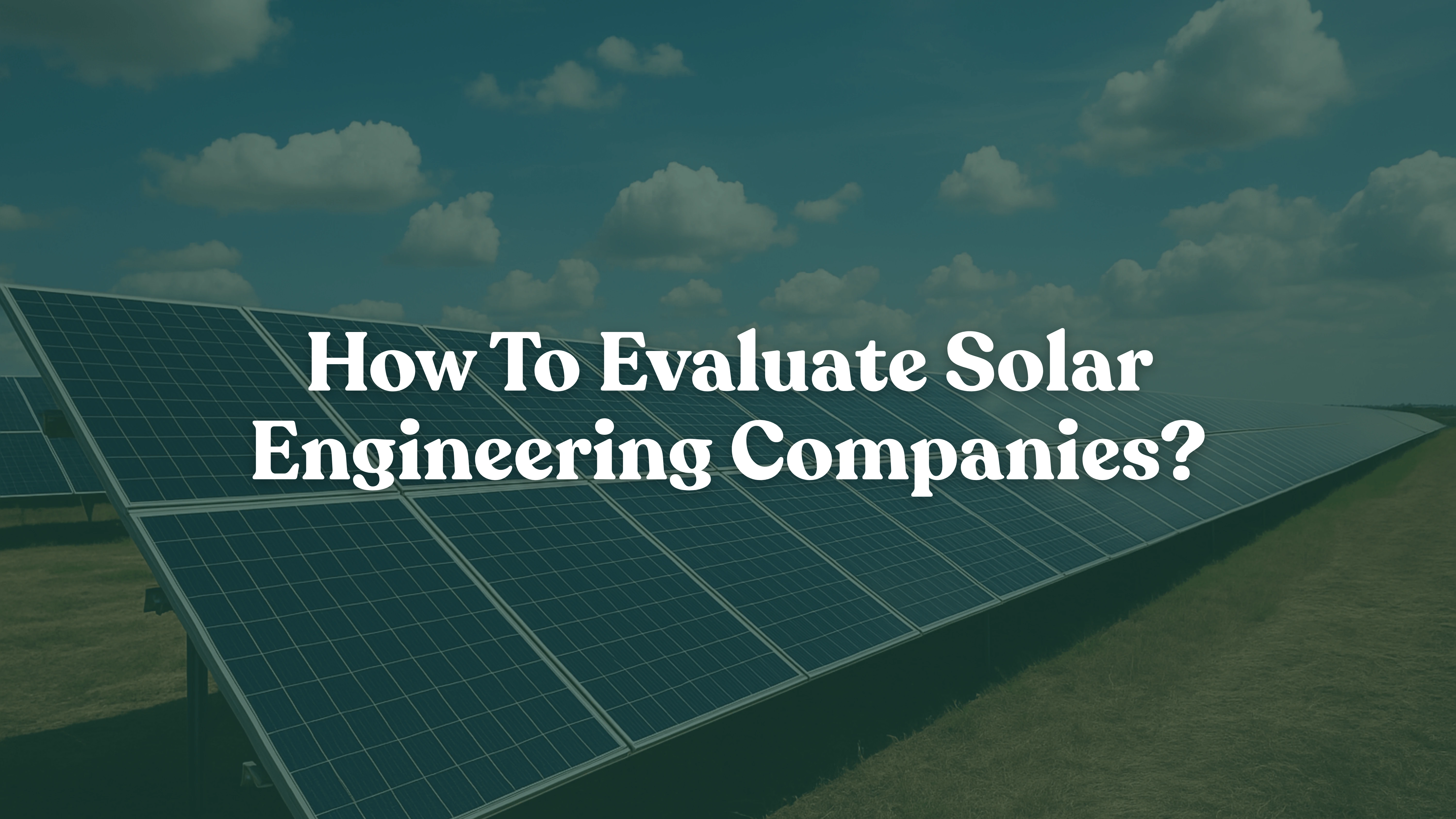How to Evaluate Solar Engineering Companies: A Business Leader’s Guide to Smarter Solar Investments

If you’re running a business and thinking about solar, you’re not alone. But choosing among the sea of solar engineering companies can make or break your investment. I’m not talking about cookie-cutter installers or flashy sales teams—I mean real engineering talent that builds solar infrastructure capable of lasting 25 years or more, under real-world conditions.
When the stakes are high, shortcuts aren’t just risky—they’re expensive. And trust me, I’ve seen the difference between great solar engineering companies and the ones that just want to sell systems. The real pros don’t just bolt panels on a roof. They architect energy ecosystems tailored to your site, utility rates, structural load, and future expansion needs.

What Sets Solar Engineering Companies Apart?
Solar engineering companies specialize in the technical backbone of solar projects: site assessment, design, structural calculations, electrical schematics, performance modeling, and code compliance. These firms bring a level of rigor and precision to projects that standard installers often skip.
If your business depends on a clean interconnection approval or maximum uptime, hiring an engineering-focused company ensures that you’re not stuck redoing work because of overlooked voltage drop calculations or missed rapid shutdown requirements.
EPC vs. Pure Engineering: Know the Difference
EPCs (Engineering, Procurement, and Construction firms) bundle services into one contract. While convenient, they sometimes favor cost over quality in the design phase. Solar engineering companies, on the other hand, focus purely on getting the engineering right—the layout, load studies, and line diagrams that determine if your system will actually perform.
I’ve consulted for projects where switching from an EPC-led design to a third-party solar engineering company added months of delay—but saved the client from years of suboptimal performance. Don’t underestimate the impact of expert engineering.

Why Strong Engineering Matters
Think of solar energy like any infrastructure: the better the design, the better the outcome. You wouldn’t build a commercial building without a structural engineer. So why gamble with a solar array that will sit on that building for three decades?
Top solar engineering companies understand:
- Local AHJ requirements and NEC code updates
- How to model solar irradiance using TMY3 data sets
- Structural analysis for live and dead loads
- Thermal coefficients that affect voltage ranges
- Battery interconnection and BESS configuration
They also catch details others miss: derating from shading, fire setbacks on rooftop systems, string sizing in mixed-module environments, and utility-specific interconnection guidelines.
Choosing the Right Solar Engineering Company
Here’s what to consider before signing any contract:
- Project Scale Experience
- Don’t hire a residential-focused company to engineer your 1 MW ground-mount system. Ask about their portfolio and confirm experience with similar projects—carports, canopies, rooftops, or trackers.
- Software Proficiency
- Look for firms fluent in:
-
- HelioScope or PVsyst (for energy modeling)
- AutoCAD Electrical or Revit (for system schematics)
- ETAP, SKM, or similar (for load flow and arc flash studies)
-
- Professional Engineers on Staff
- Check if they employ licensed Professional Engineers (PEs), especially ones registered in your state. PE-stamped drawings are often required for permitting.
- Interconnection Knowledge
- Have they worked with your local utility before? Are they familiar with Rule 21 in California or IEEE 1547 requirements? If you’re planning energy export, make sure they understand grid compliance.
- Code Familiarity and Certifications
- They should be fluent in NEC Articles 690, 705, 706, and UL 1741. NABCEP certification isn’t mandatory, but it signals a commitment to excellence.
The Real Cost of Bad Engineering
I once advised a manufacturer who was promised a turnkey solar system. The system was built—but within six months, half the inverters were derated due to poor string sizing and heat-related clipping.
It turned out the original design firm didn’t account for high summer temperatures, which pushed voltages outside of spec. The result? Energy losses, inverter warranties voided, and lawsuits pending. That’s the price of hiring the wrong company.
Names You Should Know
Several solar engineering companies stand out for their commercial-scale expertise:
- SepiSolar: Known for engineering documents, forensic PV services, and code-compliant design sets.
- GreenLancer: Offers fast, affordable stamped plan sets for permitting.
- Kimley-Horn: Full-service engineering firm with deep experience in solar and civil infrastructure.
- CNG Engineering: Design-build experts with utility and DG experience.
- Blue Ridge Power: Emerging player with a strong EPC background and in-house engineering.
But don’t go by brand alone. Look at resumes, past project types, and the quality of their deliverables.

Red Flags to Watch For
- Firms that use cookie-cutter templates for all project types
- Vague answers about jurisdictional knowledge or permit timelines
- No record of previous commercial-scale projects
- Outsourcing engineering to overseas or uncertified freelancers
- Refusal to model load-side conditions or transformer sizing
Solar Engineering Companies vs. Solar Installers
It’s tempting to go with a local installer who claims they “do it all.” But for businesses spending six to seven figures, a specialist approach pays dividends.
Think of solar engineering companies like architects. Would you hire your contractor to design the building? Maybe for a shed. Not for a $1 million energy system.
Maximize ROI Through Better Design
Every dollar saved in poor design often costs triple in lost energy, service calls, or missed incentives. Well-engineered systems:
- Generate more kWh per watt installed
- Pass inspection the first time
- Operate longer with fewer issues
- Scale better with future storage or EV additions
Your ROI begins with your blueprint.

Final Take: Engineering Is the Smart Play
Solar is more than a purchase. It’s an infrastructure investment. And just like roads, bridges, or factories, it demands serious engineering.
If you’re serious about maximizing energy savings and hitting your decarbonization targets, you need solar engineering companies that treat your site like a mission-critical asset. Not just another job.
Hire smart. Ask hard questions. And choose a partner who understands the science, the standards, and the stakes.
Because when the sun comes up and your system performs exactly as designed, that’s not magic. That’s engineering.

croteam